*NURSING > QUESTIONS & ANSWERS > NSG4067 Chapter 14 Impaired Cognitive Function- Delirium and Dementia, Questions & Answers. (All)
NSG4067 Chapter 14 Impaired Cognitive Function- Delirium and Dementia, Questions & Answers.
Document Content and Description Below
NSG4067 Chapter 14 Impaired Cognitive Function- Delirium and Dementia 1. Which of the following is a priority nursing intervention for the management of delirium? A) Giving the client low-dose oxyg... enation and maintaining his or her fluid and electrolyte balance B) Reducing noise and placing familiar objects in the client's environment C) Giving the client a clock, a watch, and calendars to provide the client with temporal orientation D) Providing psychological support through cognitive and social stimulation 2. A nurse is conducting a class at a senior citizens' center on factors that protect against dementia. Which of the following statements by an older adult in the class indicates a need for further teaching by the nurse? A) "No healthy lifestyle is going to ward off dementia." B) "Eating food high in omega-3 fatty acids will help preserve my thinking processes." C) "Engaging in social activities will help prevent dementia." D) "Engaging in an organized exercise program will help prevent symptoms of dementia." 3. A nurse teaches a client and care partner about cholinesterase inhibitors. Which of the following statements should the nurse include in the teaching? A) "Rivastigmine (Exelon) has a high chance of interacting with other medications." B) "Nausea, vomiting, diarrhea, and loss of appetite can be prevented or reduced by starting with a low dose." C) "Rivastigmine is only for treatment of mild Alzheimer's disease and will be discontinued as the disease progresses." D) "You should have a 'drug holiday' monthly to improve the medication's functioning." 4. Which of the following are examples of appropriate communication techniques for dealing effectively with people with dementia? A) Ask open-ended questions so the person feels he or she can make choices. B) For people in the later stages of Alzheimer disease, talk as you would to a child. C) Maintain good eye contact and use a relaxed and smiling approach. D) When the person forgets something, remind him or her not to forget next time. 5. A nurse develops a plan to addressing dementia-related behaviors in an older adult with dementia. Which of the following interventions should be included in this plan? (Select all that apply.) A) Maintain a clutter-free environment. B) Implement regular rest periods. C) Place pictures of familiar people in very visible places. D) Lay out clothing in the order in which the items are to be donned. E) Test the client's memory with each conversation. 6. An 80-year-old client was referred to a neurologist after several months of worsening cognitive deficits and has subsequently been diagnosed with Alzheimer disease. Which statement by the nurse to the client's family demonstrates appropriate use of terminology? A) "It's very difficult and stressful when a loved one becomes senile." B) "Even though your parent is demented, we will do all we can to promote his quality of life." C) "This form of organic brain syndrome is a common health problem in the ninth decade of life." D) "We always try our best to foster wellness in persons who have dementia." 7. A client was diagnosed 3 years ago with a cognitive impairment, a condition that worsened over the next several months and which culminated in his recent death. An autopsy revealed numerous infarcted brain regions resulting from vessel occlusions. This client most likely suffered from which type of dementia? A) Alzheimer disease B) Vascular dementia C) Lewy body dementia D) Frontotemporal degeneration 8. A long-time resident of an assisted living facility has just been diagnosed with Alzheimer disease. A nurse who provides care at the facility has remarked to a colleague, "It's a real shame, but at least she'll never know what's happening to her." What fact should underlie the colleague's response? A) Older adults with Alzheimer disease and other dementias rarely have insight into their cognitive deficits. B) Many persons with dementia are acutely aware of the fact that they are experiencing a cognitive deficit. C) Certain types of dementia are occasionally marked by older adults' awareness of their disease. D) An awareness of dementia is an indication that the condition is either latent or resolving. 9. A gerontological nurse has been providing ongoing care for an older adult who has a diagnosis of dementia. What goal should the nurse prioritize when conducting ongoing assessment of this client? A) Identifying strategies that can be used to cure the client's dementia B) Identifying genetic or lifestyle factors that may have contributed to the client's dementia C) Determining whether the client has Alzheimer disease, Lewy body dementia, or frontotemporal lobe dementia D) Identifying factors affecting the client's functioning and quality of life 10. A nursing home is in the planning stages of building a new wing that will be specifically designed for the needs of older adults who have dementia. What design characteristic should be included in this new facility? A) Monochromatic walls and floors that are a neutral color B) Pictures, signs, and color codes for identifying places C) Bright, glossy floors that can provide sensory stimulation D) Bright lighting during the day and total darkness at night 11. A nurse prepares to administer scheduled medications to a new resident with mild non-Alzheimer-type dementia. Which of the following type of medication should the nurse administer without concern of worsening delirium? A) An anticholinergic B) An atypical antipsychotic C) A benzodiazepine D) A cholinesterase inhibitor 12. A 74-year-old client is diagnosed with mild Alzheimer disease. He has no other noted health issues. When speaking with the nurse, he expresses concern regarding the progression of his disease. Which statement by the nurse is most appropriate? A) As you have no other health issues, the progression is usually gradual. B) The medications stop the progression of the disease. C) We never know how fast Alzheimer disease will progress. D) Yes, progression is usually fairly fast, you might want to start making plans. 13. A intensive care nurse cares for an 83-year-old with sepsis. The client exhibits illogical thinking and agitation. Which intervention should the nurse implement? (Select all that apply.) A) Administer a benzodiazepine. B) Assess for pain. C) Assure a quiet, dark sleep time. D) Initiate fall prevention program. E) Post pictures of client's family in room. . 14. A nurse councils a care partner of a client with dementia. The care partner states "He fights me when I try and bath him; he hasn't had a shower in 2 months!" Which response by the nurse is most appropriate? A) "I hear your frustration." B) "He wants to feel he has a choice. How do you get him to shower?" C) "I would just put him in there, he needs to be clean." D) "Whatever worked before should work now." E) "What other ways have you tried to assure he is clean?" 15. A nurse observes an aide asking a client what he wants for breakfast, lunch, and dinner while assisting him to toilet. Which action by the nurse is most appropriate? A) Direct the aide to present only one idea at a time. B) Encourage this small talk. C) No action is required. D) Tell the aide to avoid conversations while the client is toileting. [Show More]
Last updated: 1 year ago
Preview 1 out of 6 pages
Instant download
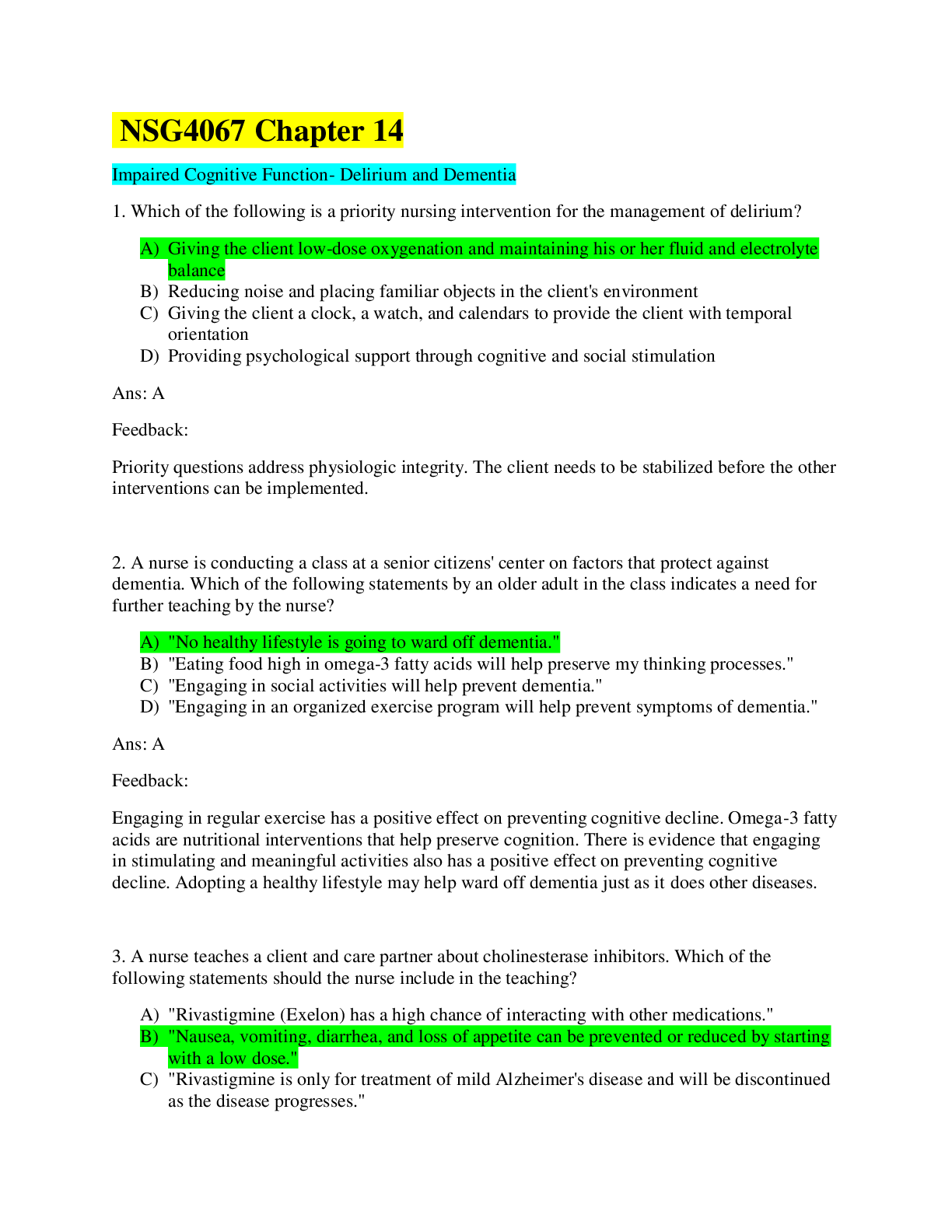
Buy this document to get the full access instantly
Instant Download Access after purchase
Add to cartInstant download
Reviews( 0 )
Document information
Connected school, study & course
About the document
Uploaded On
Apr 08, 2020
Number of pages
6
Written in
Additional information
This document has been written for:
Uploaded
Apr 08, 2020
Downloads
0
Views
51

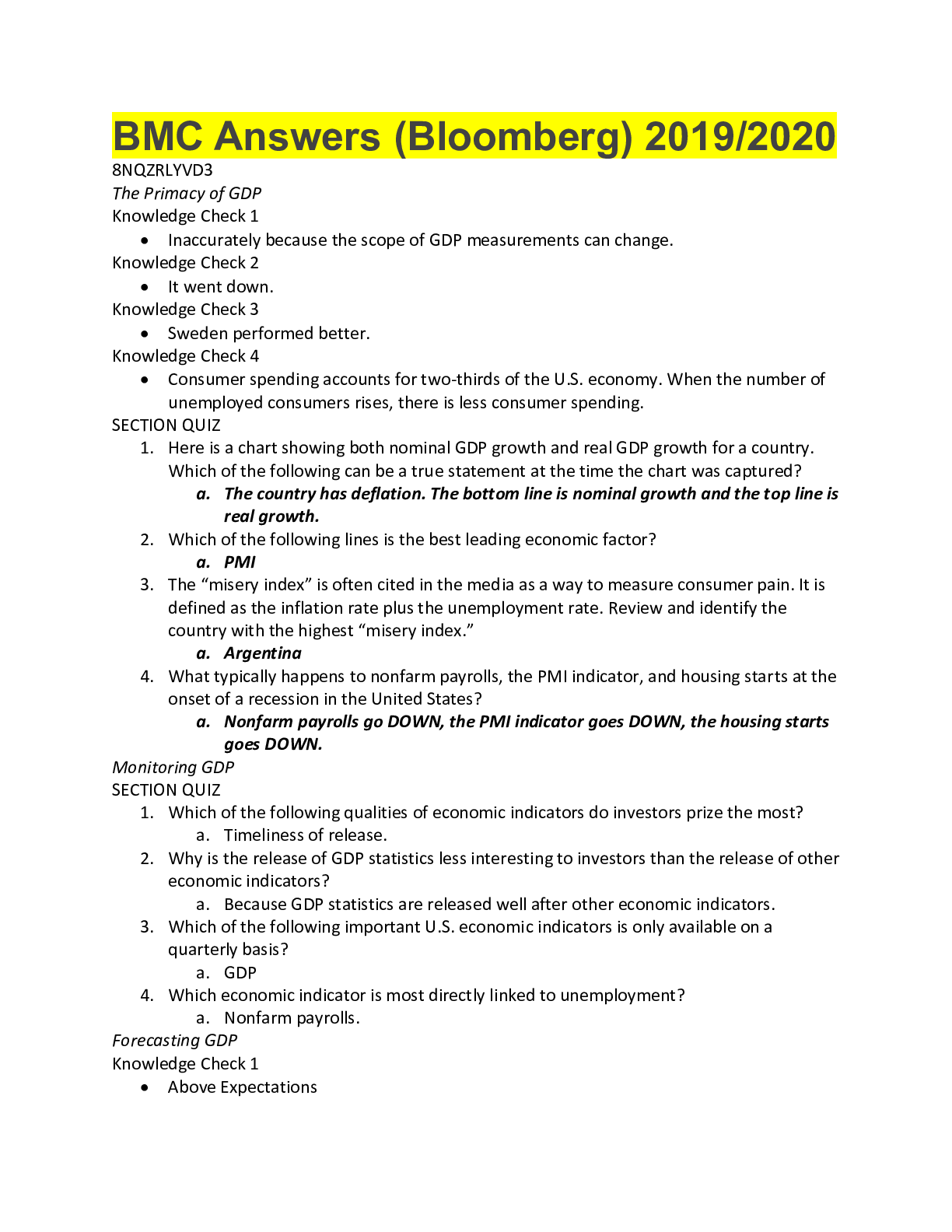
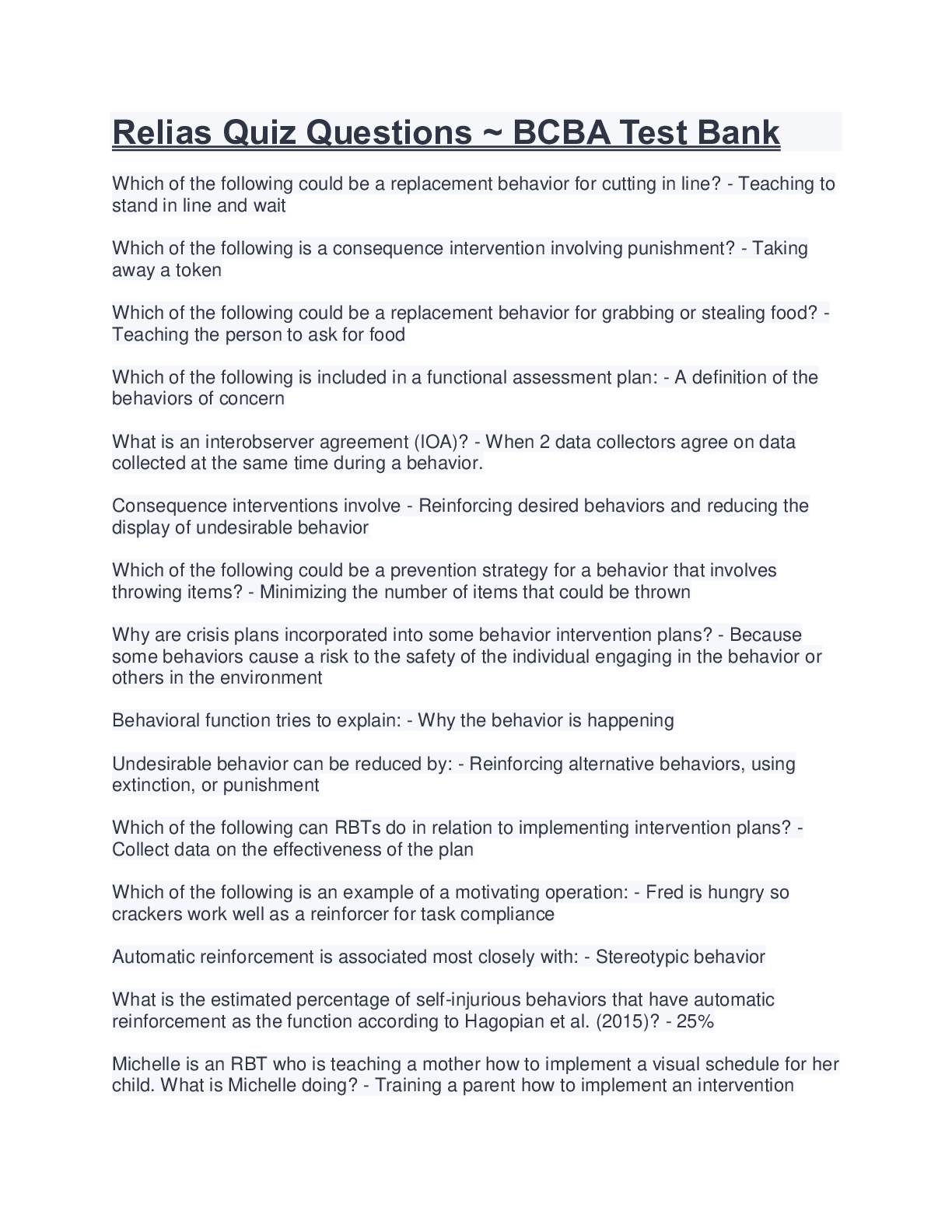
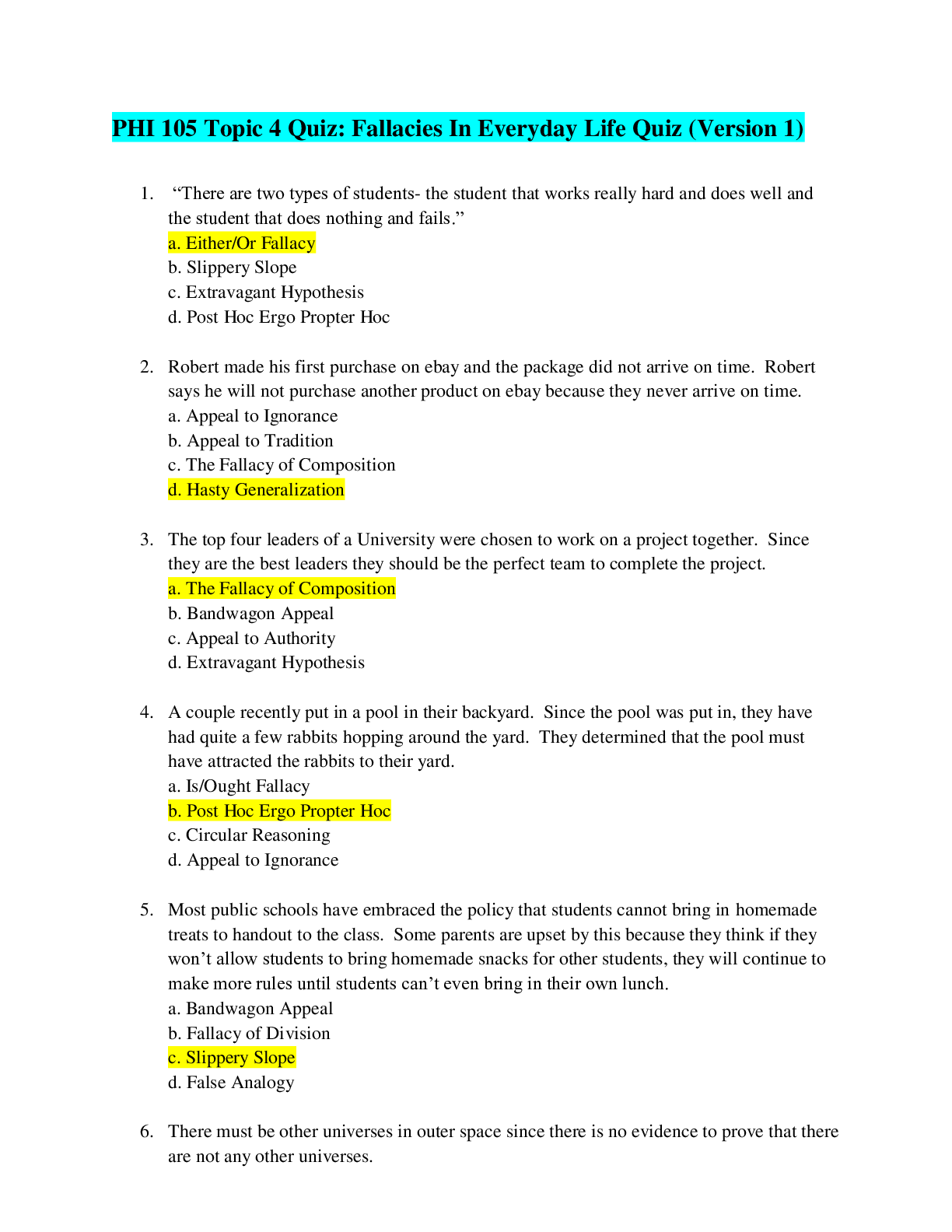

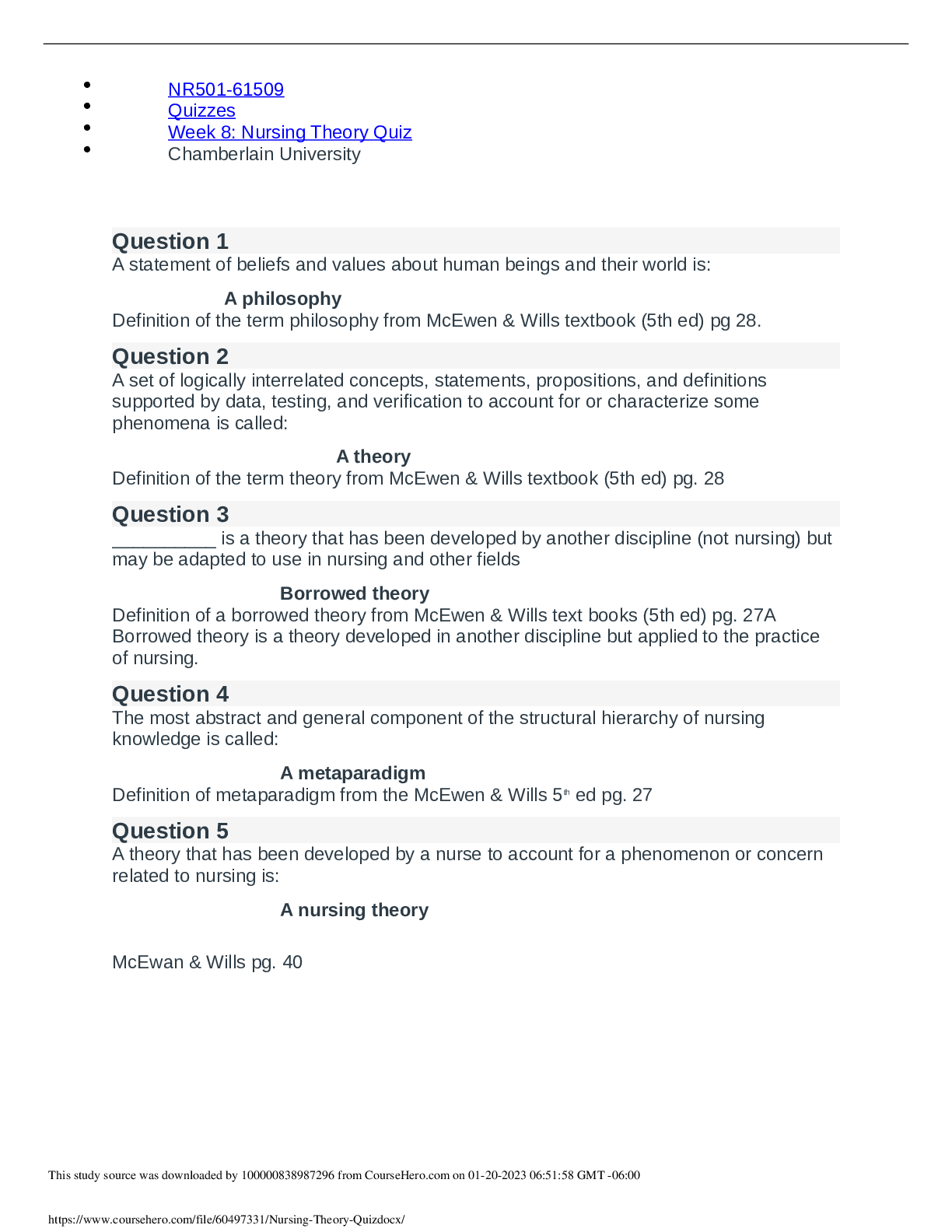
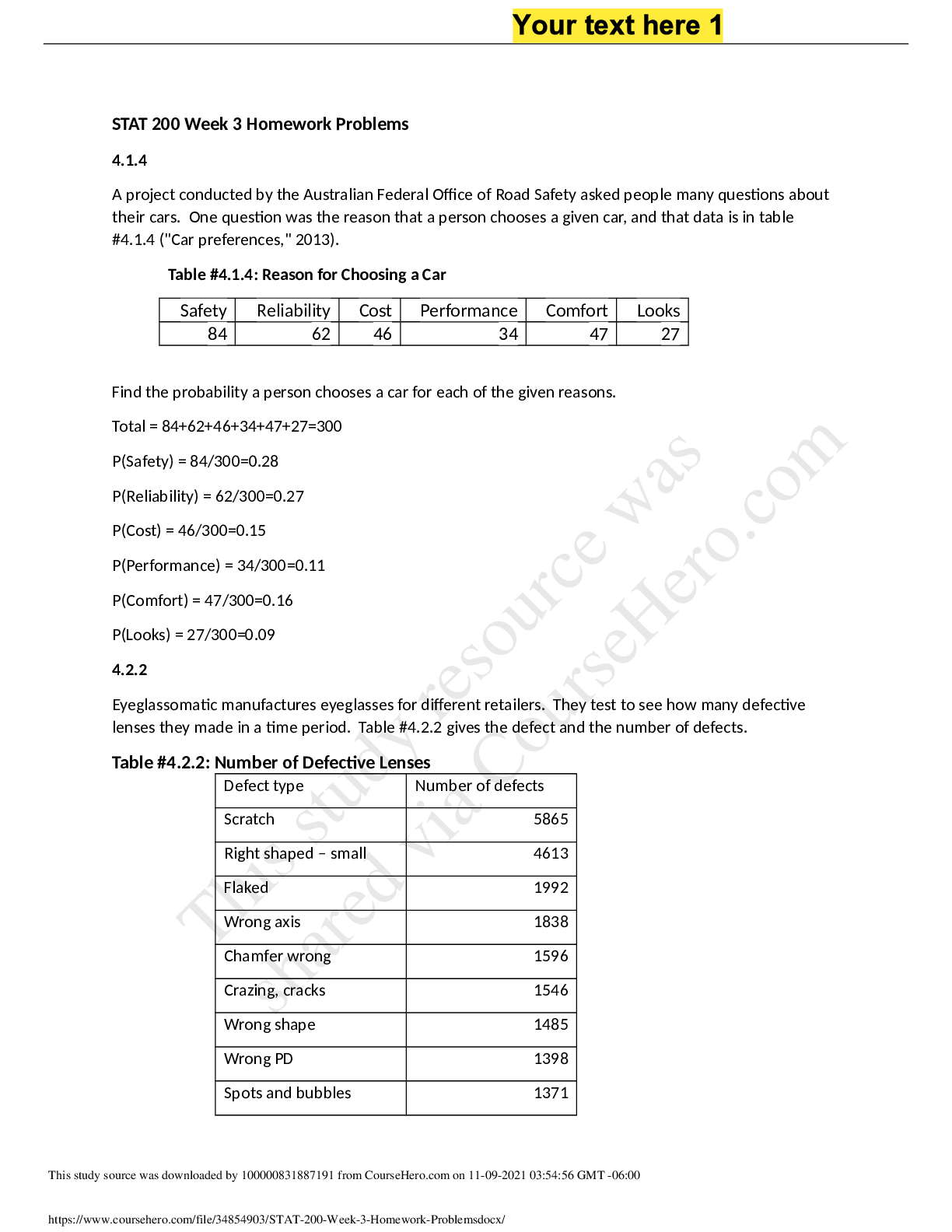
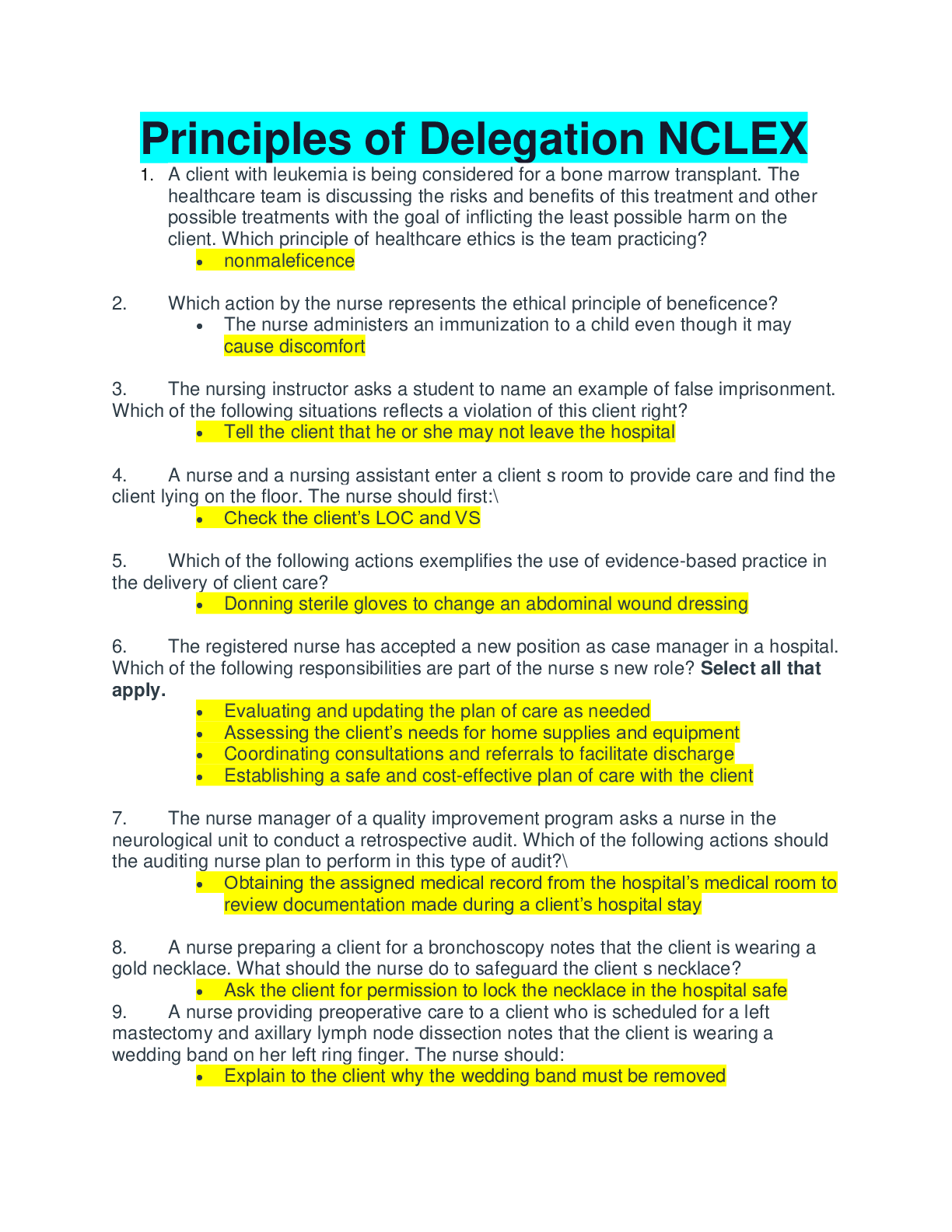
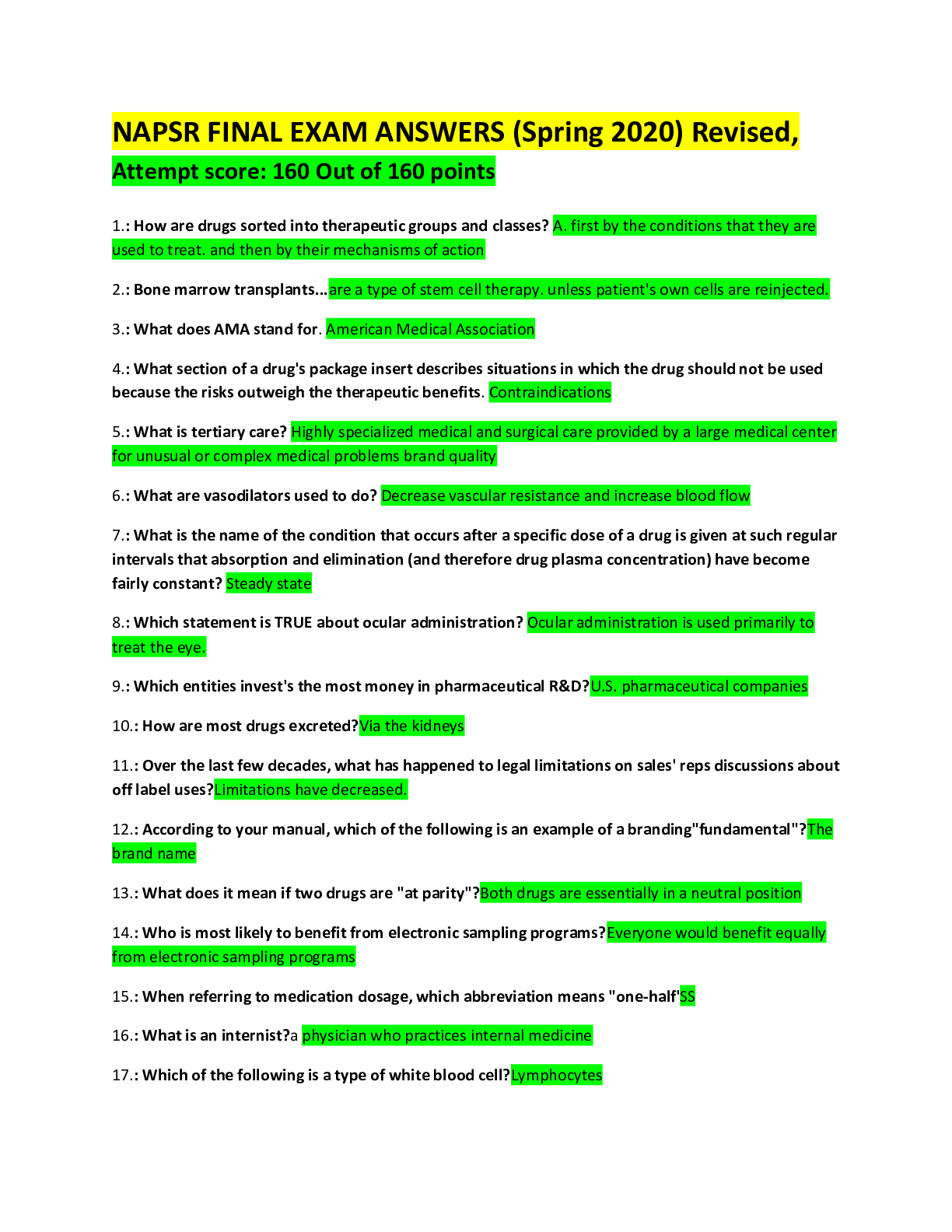
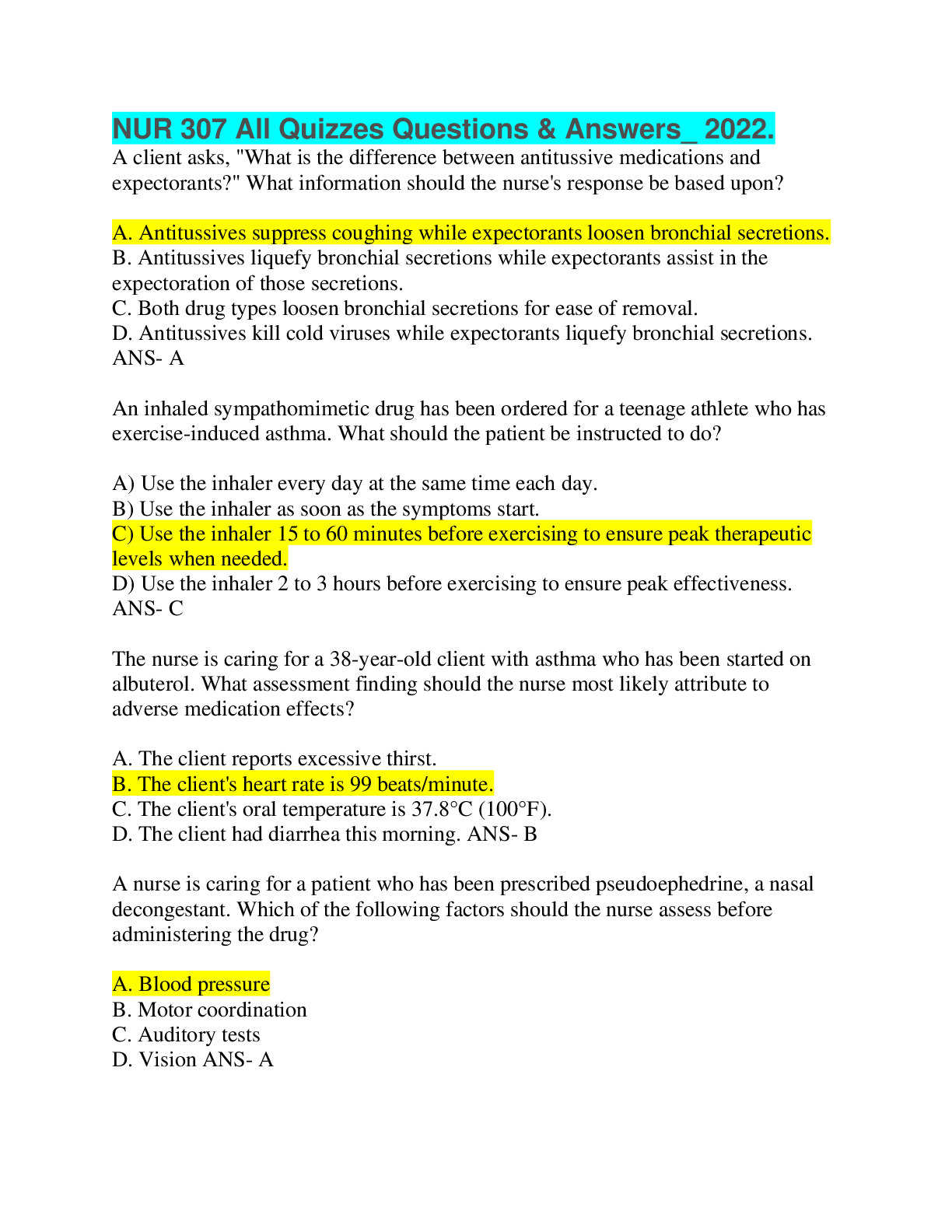
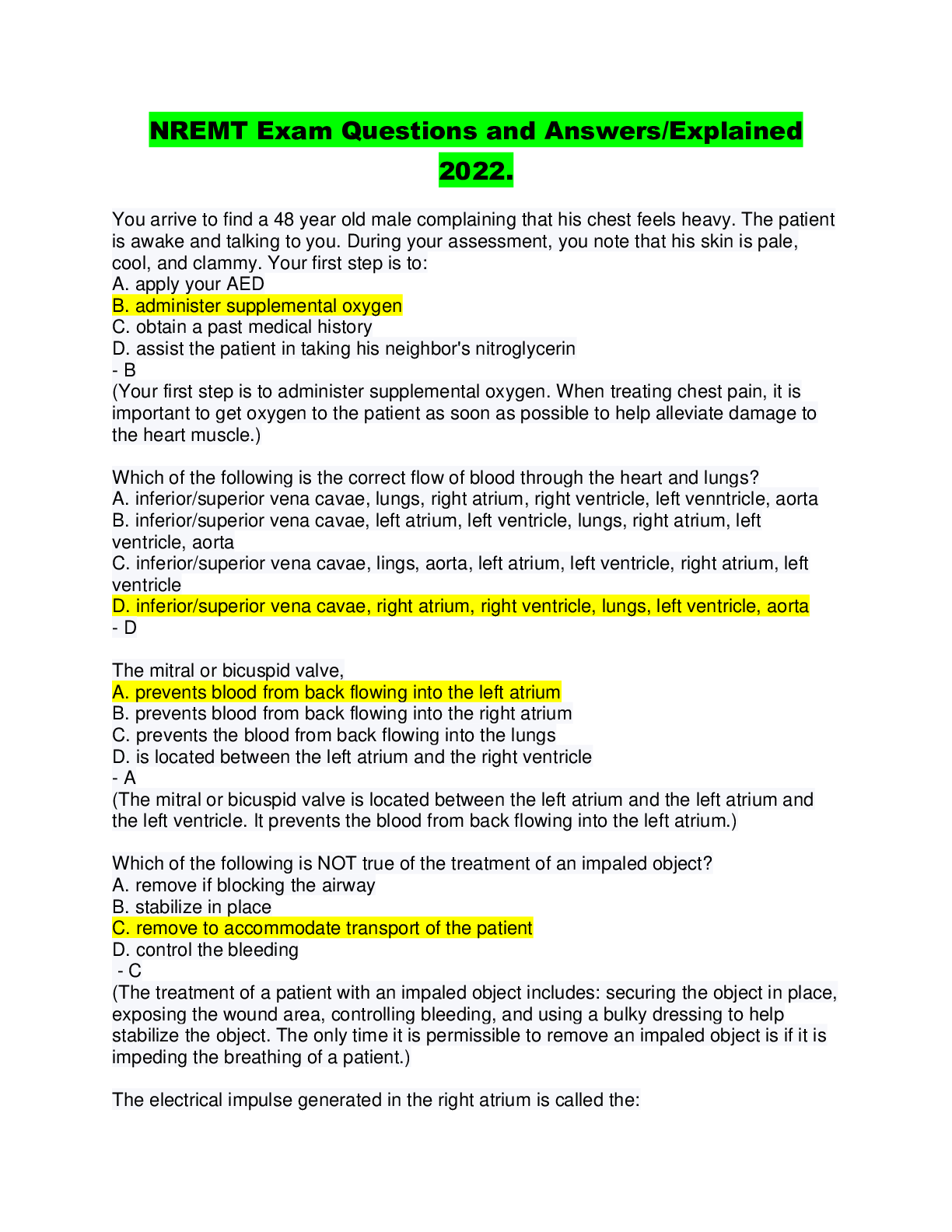
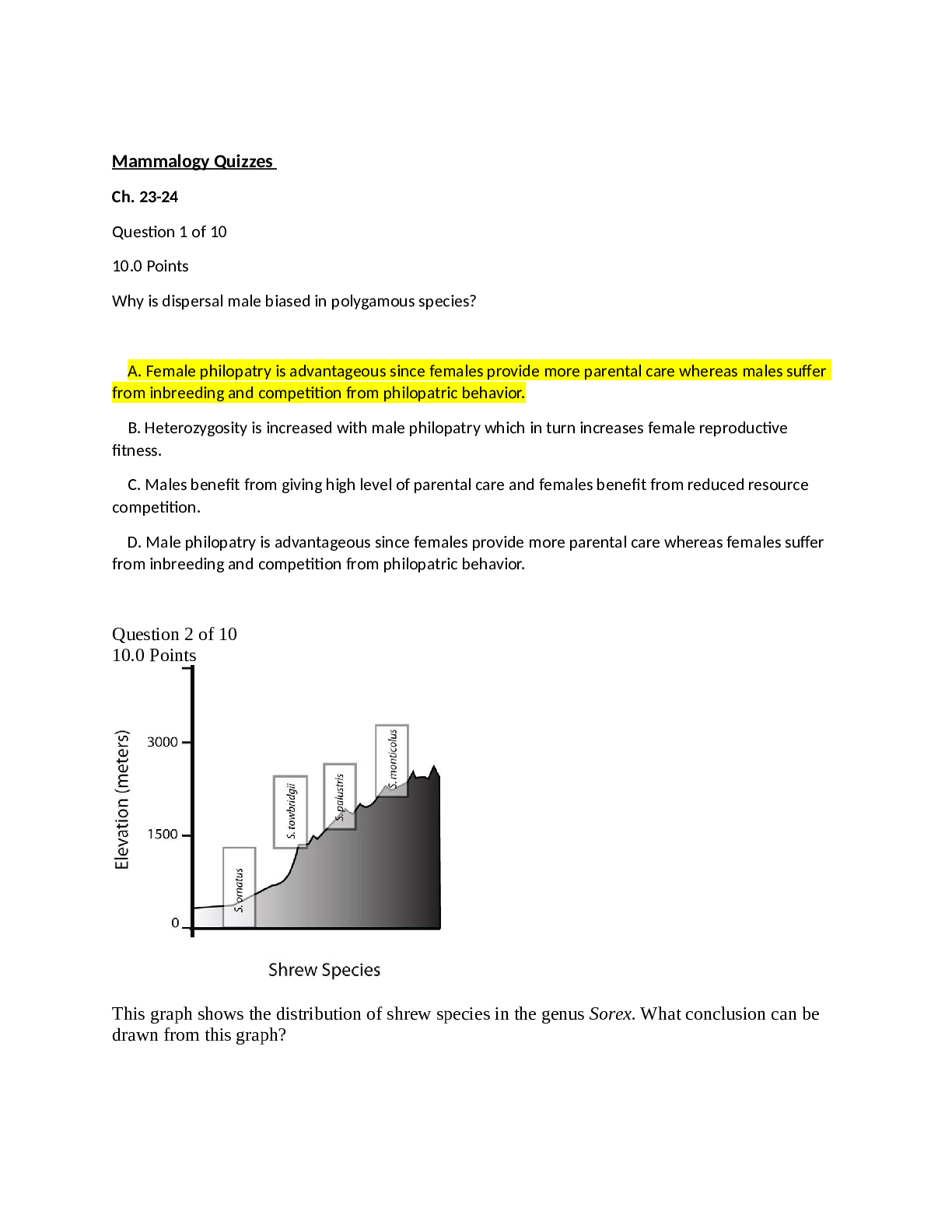
.png)

